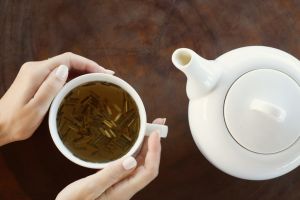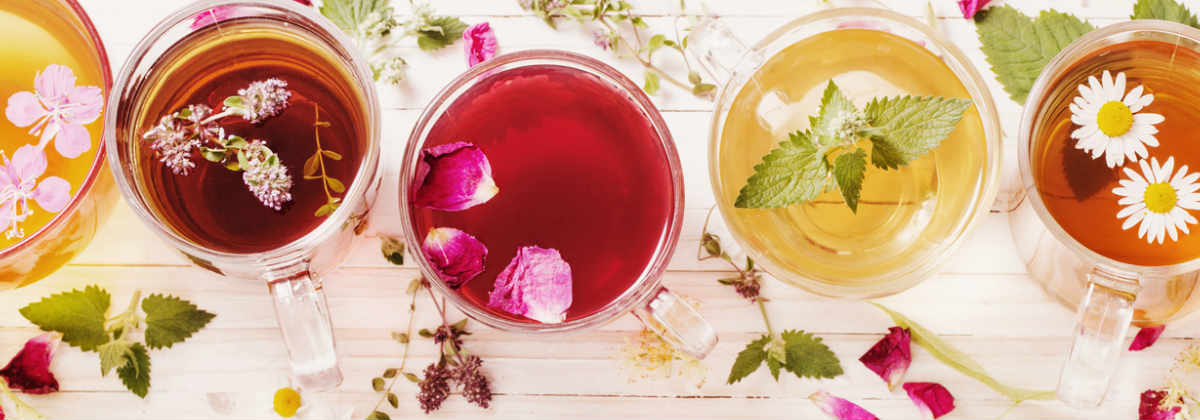First we had weight loss pills. Then we had weight loss shakes. Now, the latest craze is all about weight loss tea.
These are not the same as regular teas – like your green tea, rooibos, Sencha, chamomile, or good old English Breakfast – even though sometimes the ingredients lists look quite similar. The difference is in the marketing, trying to sell you on ingredients claimed to promote weight loss, rather than just taste good.
Weight loss teas are claimed to do all sorts of things to your body, like ‘alkalise’, ‘detox’ or ‘burn fat’. These herbal concoctions, sometimes referred to as a ‘teatox’, seem a little too good to be true – a tasty, virtually zero calorie treat that improves your health, lifts your energy levels, and drops those extra kilos away.
What is weight loss tea?
 Weight loss tea is a type of tea product marketed as a weight loss supplement or detox tool. Weight loss tea is usually sold in the form of teabags, but it can also come as loose leaf. Most weight loss tea brands retail exclusively online, with some available in specialty stores.
Weight loss tea is a type of tea product marketed as a weight loss supplement or detox tool. Weight loss tea is usually sold in the form of teabags, but it can also come as loose leaf. Most weight loss tea brands retail exclusively online, with some available in specialty stores.
What’s in weight loss tea?
It varies by brand, but generally weight loss teas contain some combination of tea leaves, herbs, and other plant matter. These usually include ingredients claimed to be ‘superfoods’ or ‘fat burners’, with emphasis on their ‘natural’ qualities. The most active ingredient usually found in these teas is a natural laxative.
How much does weight loss tea cost?
Below is an indication of price per tea bag or per serve from some of the bigger brands. Prices obtained from product websites and leading online retailers.
| Brand | Price Per Serve |
|---|---|
| Slimming Tea | $1.93 – $2.29 |
| Teatox Australia | $0.88 – $1.29 |
| Skinny Me Tea | $1.07 – $1.85 |
| Thin Tea | $1.07 -$1.25 |
| X50 | $0.83 – $1.66 |
Does weight loss tea help you lose weight?
In short – probably not. Let’s go through some of the common claims made by companies that try to sell you on the whole teatox myth. These claims are usually tenuous at best. We have sourced expert views from around the web to help shed some light on the situation.
- Detox: Unless you have something wrong with your liver or kidneys, the expert view is usually that you don’t need help to detox your body. Your organs are far better at removing toxins and waste from your body than anything you could eat or drink that is said to be a ‘detox’. If you do have liver problems, you should be seeing a doctor and following their advice rather than some tea merchant.
- Fat burning: Despite what the purveyors of all kinds of weight loss products may claim, experts typically say there’s only one sure fire way to break down body fat. Exert more energy than you consume, and your body will begin breaking down energy stores from your body fat. There are ways to maximise this process by using metabolism-enhancing ingredients, but you will be best placed asking a doctor about what options could work for you. Most of the ‘fat-burning’ claims made by manufacturers of weight loss products are rubbish.
- Alkalise: Some alternative health advocates argue that an acidic body pH is linked to what we eat and is harmful for our health. The problem with that is that there’s no consistent body pH – each system and organ in our body operates differently. An alkaline pH is also not a holistic ‘healthy’ metric. For example, your stomach is meant to be an acidic environment to break down food. Your body regulates its pH of different systems perfectly well. Drinking a bit of special tea can’t undo your own body’s systems.
Weight loss tea could give the illusion of ‘weight loss’ by inducing diarrhoea (from teas that contain laxatives such as senna or cassia). This isn’t really meaningful weight loss, it’s mostly body water, so you’re probably losing weight by dehydrating yourself.
A tasty tea can be useful for helping you feel full and satiating cravings for a snack, as (provided there’s no added sugar or milk) tea contains very little energy. There’s no need to spend your money on fancy diet tea to get this effect – any tea will do the same thing.
What brands of weight loss tea are available?
There are at least dozens of brands selling teas claimed to help with weight loss. Here are a few of the more prominent brands for Australian consumers:
Slimming Tea Australia
The original Slimming Tea contains seven ‘superfoods’ – green tea, pu-erh tea, garcinia cambogia, hibiscus, goji berry, rose petals and dandelion leaf. The brand claims that these together cause your body to absorb less fat, increase metabolism, suppress appetite, reduce water retention, reduce cholesterol, reduce blood sugar levels, and reduce the likelihood of cancer cells forming. The 14 Day CleanseTox tea contains some laxative ingredients, including senna leaves. The company warns against drinking more than one per day and don’t continue drinking for more than 14 days – probably because the laxative effect can be dangerous in large or prolonged doses.
Teatox Australia
Touted as a ‘natural’ way to ‘cleanse’ the body, Teatox claims that its tea will boost your metabolism, flush out toxins, reduce bloating and burn body fat. Teatox tea contains radish seed, oolong tea leaves, hawthorn, lotus leaf and cassia seed. The brand claims that Teatox products are free from laxatives and caffeine, however it seems cassia is usually considered a laxative and oolong generally contains caffeine, unless it’s been decaffeinated. Teatox recommends drinking two teabag brews per day. It’s also available as ‘flower bombs’ which each make 4-5 serves of tea, for ‘teatoxing’ together with others.
Skinny Me Tea
The two-step ‘Teatox’ program involves a Morning Cleanse tea, for daily consumption with breakfast, and an Evening Cleanse, for consumption every second night before bed. The Morning Cleanse contains Sencha green tea, green oolong tea, and a variety of herbs including artichoke extract. The Evening Cleanse contains senna leaf, valerian root and celery seed. The brand claims the program increases energy and decreases bloat. Skinny Me Tea also offers acai tea and ComplexionMe tea (green oolong tea, Sencha green tea, and herbs).
Thin Tea
One of the brands that claim to ‘alkalise’ the body, which apparently enhances nutrient absorption, Thin Tea is very adamant that it does not contain laxatives, unlike many competitors. Thin Tea’s products are sold as loose leaf herbal blends, in both the weight loss focused combo of the Detox Blend and Fat Burn Blend, as well as ClariTea (for mental focus), Stress Less (for relaxing anxieties), and Sleepy Slumber (for easier sleep). The Detox Blend is claimed to cleanse, stimulate and ‘harmonise’ the body, while the Fat Burn Blend (for drinking just before dinner) is claimed to boost metabolism and reduce appetite. Thin Tea recommends consuming one of each of the Detox and Fat Burn teas per day.
Green Tea X50
An instant supplement made of resveratrol, green tea, sweeteners (xylitol or stevia) and other ingredients, Green Tea X50 is marketed as an energy and metabolism-boosting drink. The brand claims the resveratrol content has anti-aging properties – a claim yet to be proven by scientific evidence from what we could find online. It also claims the concentrated green tea content and its corresponding high antioxidant content promotes weight loss. Sachets are mixed with water to drink, and can be used as a supplement in food – the Green Tea X50 website offers recipes in its blog.
Should I try weight loss tea?
If you’re looking for something to help you lose weight, there seems to be zero evidence that any weight loss teas work. Drinking any kind of tea can be good for you – it’s a source of hydration, and it has some small health benefits. Drink it black without any sugar and it’s probably one of the healthiest beverages you can choose, apart from, of course, water. However, is there really such a thing as fat burning tea? It seems unlikely.
Please note that the information provided in this article is not health advice. Always consult your doctor before taking on any new weight loss programs.

Share this article